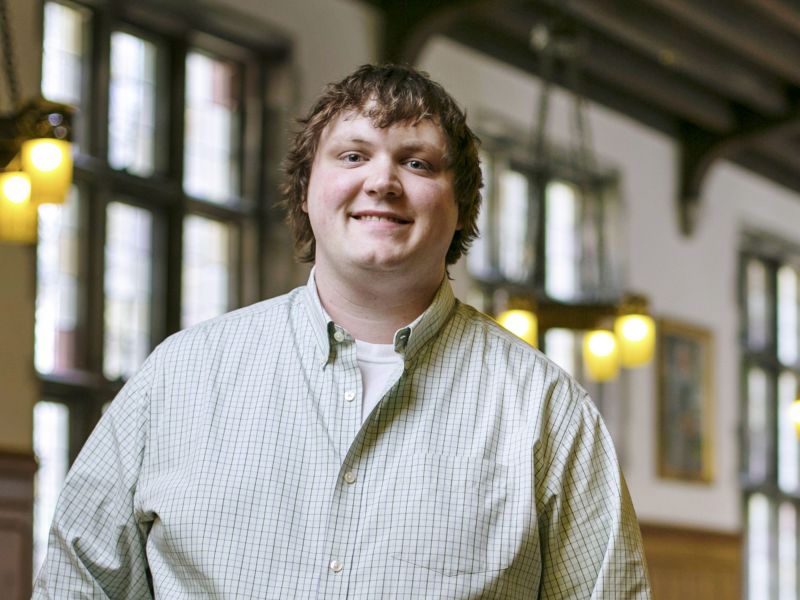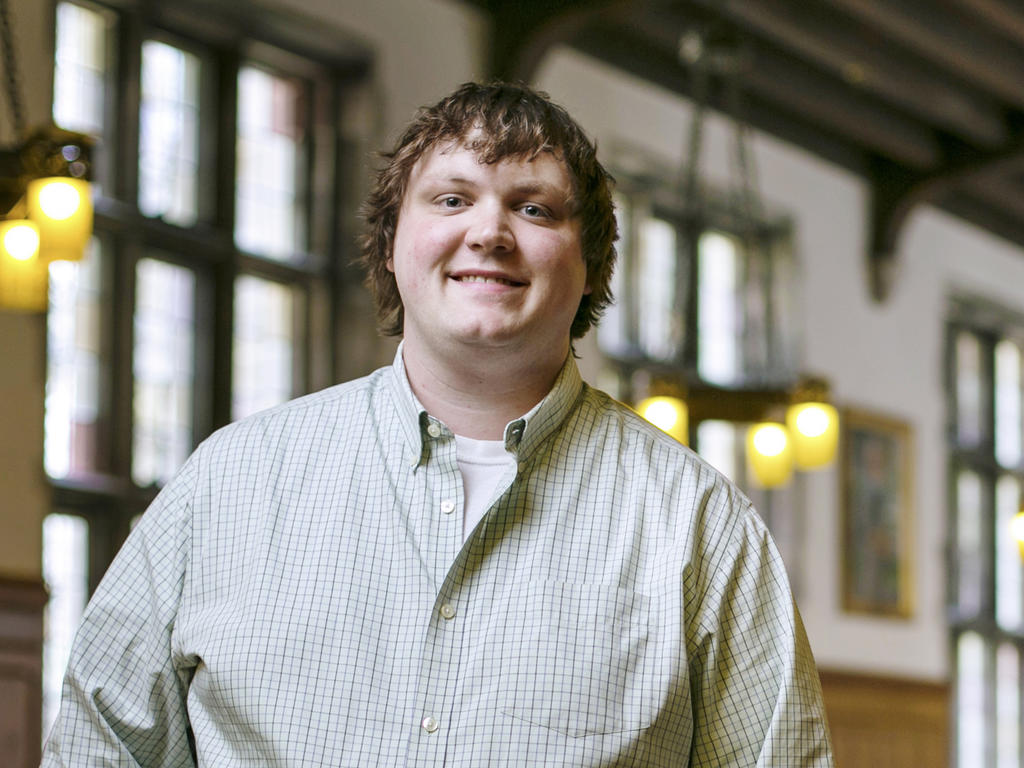Hometown: Fayetteville, AR
Major: Anthropology/Sociology
Minors: Asian Studies and Religious Studies
Tell the story of how you got to Rhodes.
After high school, my girlfriend Chelsea (now my wife--we got married last August) and I decided to take a gap year to volunteer in our community. We worked with various nonprofits including the United Way, the Teen Action and Support Center, the Samaritan House, and Helping Hands Inc. In addition to these nonprofits, I also began volunteering at the Rogers Historical Museum, a local history museum that is also a city department in Rogers, AR, where we are from. My volunteer work with the museum eventually turned into an internship, and then into a paid research assistantship, in which I conducted research and fabricated displays for several long-term museum exhibits. When Chelsea and I began thinking about college applications, we knew that we wanted to go to a great school, so we applied to many programs all over the country. When we found out that we were both accepted to Rhodes, we decided to visit the campus for Admitted Students Day. We knew Rhodes was a great school with an excellent reputation, but, upon walking around its beautiful campus, seeing its stately buildings and the azaleas blooming in the Memphis summer sunshine, we were hooked. Not to mention, we sat in on several classes, and were immediately impressed by the talented and engaging professors.
How have you changed since beginning your studies at Rhodes?
I came from a fairly conservative and religious community, and, although we had gone to church when I was younger, my family was not very religious. Based on interactions I had had with people in high school, I had an ambivalent relationship with Christianity. This all changed while taking the Search program; for the first time, I encountered different interpretations of the Bible and other western classic texts, and this really changed the way I thought about religion. The more classes I took, the more interested I became, and I eventually changed my major to religious studies. But, from the beginning, I had also taken classes in anthropology, thinking I wanted to be an archeologist, and when I saw a posting for a Sociology of Religion course, I decided to take it. I quickly realized that my interest in religion had really been sociological all along. I changed my major yet again, and converted my former religious studies major into two minors: Asian studies and religious studies. Throughout this whole process, and well before coming to Rhodes, I had known that I wanted to be a professor, it was simply a matter of deciding which discipline. I started taking sociology courses left and right, and after taking Social Theory, I knew that sociology was the discipline I wanted to pursue as a career.
Tell us about your involvement with the Worker’s Interfaith Network (WIN), a Memphis-based nonprofit dedicated to fighting for workplace justice in the community.
WIN is focused on three main causes: 1) they are committed to ensuring that employees are aware of their state and federal rights pertaining to things such as wage and hour laws, and health and occupational safety standards; 2) they fight against wage theft, an umbrella term for exploitative labor practices; and 3) they are committed to pushing for legislation that would raise the current minimum wage.
I first became involved with WIN after taking a Liberation Theology class with Professor Ivory in the religious studies department. The authors of the works we read claimed that there is no “neutral” in the fight for justice; any action not in the support of justice is in the support of the status quo and the oppression inherent within it. This was a really powerful lesson for me, and one I will not soon forget. It woke me up to the fact that, as a white, heterosexual, middle-class male, I benefit from structural and institutional systems of privilege and oppression that simultaneously push others down. I sought a way to be a part of the change that I knew needed to take place, and I found WIN in the process. As my academic interests changed and I became interested in sociology, my relationship with WIN changed too. I knew I would eventually have to conduct research, and I could think of no better place to do it than WIN.
Eventually, I applied and was accepted to the Rhodes Institute for Regional Studies, where I was able to conduct independent research under the guidance of a faculty mentor and with the support and feedback of a diverse group of peers and professors. Rhodes Institute was definitely one of the best things I have done at Rhodes, and I would absolutely recommend it to any student or potential student who thinks they might be interested in conducting independent research. Before the Institute, I knew I loved sociology, going to class, having conversations, etc., but after the Institute, I learned that I also love conducting social research, a skill that will be vital to my future career.
How did this experience impact your studies?
The Rhodes Institute offered me a wonderful opportunity to receive funding and support while gaining valuable first-hand research experience that ultimately was important in my senior thesis. I was also able to use the paper that I wrote for the Rhodes Institute as a writing sample for graduate school applications and as my submission to the 2014 Southeastern Undergraduate Research Symposium, hosted by Emory University and Morehouse College. I was invited to present at the conference, along with two other anthropology/sociology seniors. I was just happy to be presenting, and never expected to win anything, but it was wonderful to have some external validation for my research. My paper, titled “Wage Theft and the American Dream: Social Movements, Cultural Narratives, and Interpretation,” attempts to paint a complex picture of the interpretive meaning-making process whereby social movement supporters engaged in the fight against wage theft become motivated by their personal experiences, their religious identities, and engagement in collective action.
My senior thesis drew heavily on this work, integrating current work in the sociology of emotions with older cultural social movements work. In the Rhodes Institute paper, I developed a theoretical framework, the Social Movement Cultural Dialectic, for understanding the interpretive meaning-making process in social movements. In my senior thesis, I used qualitative methodologies and systematic analysis to take a closer look at this theoretical framework.
Compiled by Lauren Albright ′16

